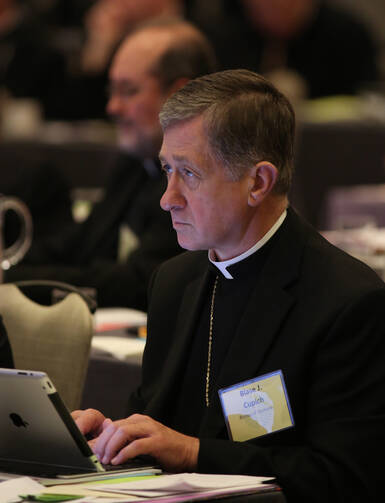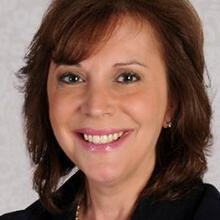In only a few cities in America would the appointment of a new bishop make national news. In a large Catholic enclave like Chicago, it’s not only big news, but material for dinner table debate and water cooler conversation.
In the last issue of America (Dispatch, "Looking for the New Shepherd," Sept. 22), I wrote of the yearning of Chicago Catholics for a pastoral bishop who would welcome dialogue, respect the priesthood of the laity and reach out to those who feel marginalized by an adherence to dogma over compassion—a yearning expressed in a book of reflections written by Chicago Catholics called An Irrepressible Hope. By early indications, Chicagoans received the leader they were seeking in Spokane Bishop Blase Cupich.
As soon as the official announcement came on Saturday, an article from the religious magazine The Tablet which painted Cupich as a leader in the mold of Pope Francis, went up on the bulletin board at St. Scholastica Monastery on the city’s North Side. “It’s a new day for the archdiocese of Chicago,” says Sister Judith Zonsius, sub-prioress at the Benedictine monastery.
“He’s said to be a moderate and that’s very Benedictine. We like a sense of balance,” Sister Judith adds. Talk of the new archbishop dominated lunch table conversation Saturday at the monastery.
Like others, Sister Judith says she was glad the job went to a Midwesterner (Cupich grew up in Omaha). “He’ll know the culture.”
Zonsius says she was also delighted when Cupich (pronounced “Soupich”) mentioned during his weekend press conference his early education with the Benedictine sisters from Mount St. Scholastica of Atchison, Kansas. Those sisters taught him at Sts. Peter and Paul Elementary School in Omaha.
Atchison Sister Mary Collins was a teacher at the school at the time and remembers Cupich well because his father worked as a maintenance engineer at the school. The young Cupich’s after-school job was to empty the classroom waste paper baskets. “He did his job with alacrity,” Sister Mary Collins says. “Maybe that was because his father was his boss.”
Now Cupich will be the boss of an archdiocese full of very vocal priests and independent-minded lay people. After his first public appearance before his new flock, many Chicagoans said they sensed the same sort of humility in Cupich that has distinguished Pope Francis on the world stage.
Penny Jaworski, a former youth minister who belongs to Immaculate Conception parish on the city’s northwest side, says Cupich scored at least one home run during his first public appearance before his new constituents. At one point during the press conference, he referred to his Croatian ancestry and said he expects he’ll be eating a lot more stuffed cabbage in his new post. “Mentioning ethnic food is probably a good thing in Chicago,” Jaworski says.
Jaworksi adds, “It sounds as if he’ll listen to the opinions of everybody and is not coming in with preconceived notions of how things should be done.”
Cupich’s predecessor Cardinal Francis George was a Chicago native who received high marks for his knowledge of the city, for his work ethic and his friendliness. But in the eyes of many Chicagoans, George was often hampered by his years as an academic and sometimes responded with an intellectual discourse when his flock was seeking a response from the heart.
Early in his tenure, he tried to clamp down on some common parish practices, like general confessions, and promptly received push back from his priests.
Cupich, on the other hand, “strikes me as a listener, very welcome in the hierarchy,” says Father Larry Janowski, a Franciscan friar.
The archdiocese is also still reeling from sexual abuse cases that came to light in the past few years, long after the bishops adopted the Dallas Charter for dealing promptly with accused abusers. “People are broken, discouraged. They want to have encouragement in their faith, they want to feel valued in their church” says Jerry Hiller, a psychologist who runs a popular lunchtime series on work and faith called “Repair My House” and at St. Peter’s Church in the heart of Chicago’s financial district.
Hiller says he hopes Cupich can manage to balance a “concern about doctrine” with a “concern for the gospel.” A sixty-four thousand dollar question in a church that in recent decades might have appeared to some as being more interested in having a smaller more “doctrinally faithful” flock than a larger more inclusive one that makes room for dissenters, doubters, questioners and seekers. “There has been too much emphasis on who’s in the family and who’s out,” Hiller says.
Cupich’s appointment to Chicago is being watched throughout the state of Illinois, where as head of the Chicago archdiocese, he will preside also over the Illinois Catholic Conference which includes the arguably more conservative bishops of Rockford, Peoria, Springfield and Belleville. (The bishop of Peoria, Daniel Jenky, is suing the Obama administration over the Affordable Care Act’s inclusion of contraceptives under prescription drug coverage and once said many clergy sex abuse survivors are merely out to bankrupt the church).
“Bishop Cupich will be breaking the mold of bishops appointed over the past several decades and that will especially be true of the bishops who currently preside over the dioceses in Illinois,” said John Ryan a Catholic activist from Bloomington in the Peoria diocese.
“I am heartened by this appointment. It is almost like having Pope Francis himself presiding up in Chicago and over our local bishops,” Ryan says. “One has to hope this means real change is coming right here in the heartland.”
Cupich will take over the job with one big advantage. For years, Atchison Benedictine Sister Thomasita Homan has been praying for him as part of her monastery’s “Befriend a Bishop” program, an effort the sisters started when they began to feel increasingly distanced from their church’s hierarchy. Sister Thomasita (who is also a native of Omaha) says she’s not only been praying for Cupich since 1998, when he was posted in Rapid City, but she has also corresponded with him over those years on social issues and whenever there were crises in the church.
“He’s a very balanced thinker. He’s compassionate and will listen well,” Sister Thomasita says. “I believe he will invite cooperation.”
Asked if she will continue to pray for Cupich in his new role, she says, “He’s at the top of my list right now.”








